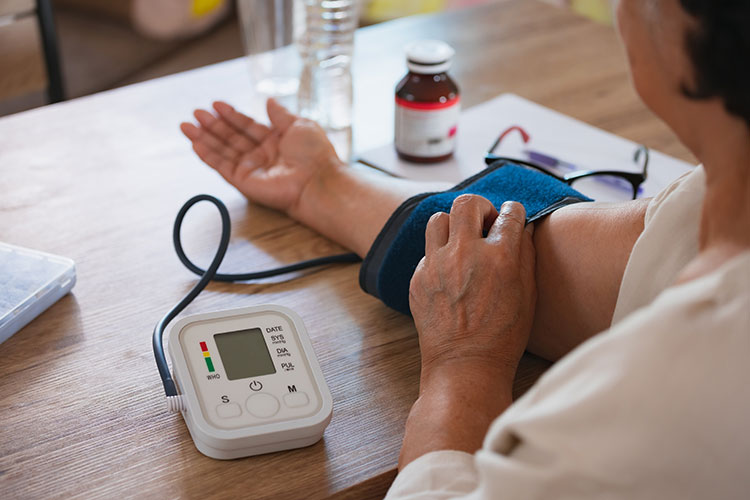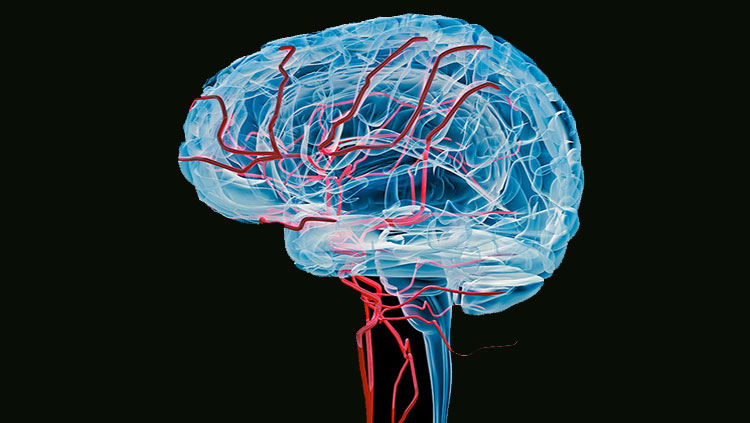Blood Pressure Drop Over Time Linked to Cognitive Decline in Women, Study Suggests
- Published24 Oct 2024
- Author Bella Isaacs-Thomas
- Source BrainFacts/SfN

Untreated high blood pressure, or hypertension, generally increases a person’s risk of developing dementia as they age. However, that rule of thumb comes with some caveats. New research from Rush University suggests that decreasing systolic blood pressure among older women — but not men — is linked to cognitive decline over time.
Women face a higher risk and incidence of developing Alzheimer’s disease compared to men, though the disparity isn’t necessarily true of other types of dementia. Still, proponents of precision medicine, or tailoring medical care based on the circumstances of specific patients, say understanding the role sex or gender may play in disease risk is key to potentially improving options and outcomes.
“This study suggests that tailored blood pressure management in older women may be important for reducing their risk of cognitive decline and dementia in old age,” said Zoe Arvanitakis, a neurologist at Rush University’s Alzheimer’s Disease Center who co-authored the study. She presented her team’s preliminary findings at Neuroscience 2024, the Society for Neuroscience’s annual meeting, in Chicago.
Arvanitakis and her colleagues assessed data from nearly 5,000 older adults who averaged around 77 years old. Around three-quarters of the participants were women. The participants were enrolled in one of Rush’s community-based cohort studies. For an average of nearly nine years, researchers conducted an annual assessment of their cognition using neuropsychological tests and tracked their blood pressure.
Diastolic pressure is the bottom number of a blood pressure reading, measuring the pressure on blood vessels when the heart is at rest between beats. Systolic pressure is the top number — the pressure within arteries while the heart is beating.
According to the American Heart Association, systolic pressure often rises as people age due to a range of factors, including plaque buildup over time. Higher numbers are linked to an increased risk of heart attack, stroke, chronic kidney disease, and other conditions.
In their study, Arvanitakis said her team found a connection between a faster decline in systolic pressure and general cognitive function — including perceptual speed and various types of memory — among women participants but not in the men participants. Changes in diastolic pressure weren’t linked to cognitive changes among any participants, and higher blood pressure remained linked to lower levels of cognition, she noted.
The new study is consistent with prior research indicating “blood pressure can tend to drop in the years preceding” a dementia diagnosis, said Daniel Nation, a professor of gerontology and medicine at the University of Southern California Leonard Davis School of Gerontology who was not involved in the study. However, he noted researchers still don’t know precisely why this decline occurs, or what its significance may be.
Estrogen helps boost heart health among cisgender women until they experience menopause, which causes levels of that hormone to drop dramatically and renders them more vulnerable to cardiovascular issues, Nation said. Part of women’s higher incidence of Alzheimer’s likely has to do with the fact they tend to live longer than men given that dementia risk increases exponentially with age, he added, though researchers don‘t yet know why.
There’s a longstanding lack of research efforts examining potential sex differences that could be relevant to the medical field. More scientists in recent years have sought to fill those gaps with the goal of improving management and care options for patients.
“Traditionally, [scientists] have not focused on sex differences. And that's been an area that has been highlighted by the National Institutes of Health and investigators around the world as needing to be remedied across all of medicine,” Nation said. This latest study, he added, “is a welcome contribution to that effort.”
Other experts note sex isn’t binary, however, and emphasize that prioritizing this variable without nuance can hinder the effort to forge more inclusive medicine.
CONTENT PROVIDED BY
BrainFacts/SfN
References
Baumgartner, N. W., Capuano, A. W., Arvanitakis, Z. (2024, October 7.) Sex differences in the association between decline in blood pressure and change in cognition [Poster Abstract]. RUSH Alzheimer's Disease Center, RUSH University Medical Center. Society for Neuroscience Annual Meeting, Chicago, IL, United States. Program No. PSTR252.15.
What to Read Next
Also In Aging
Trending
Popular articles on BrainFacts.org


.jpg)




.jpg)











